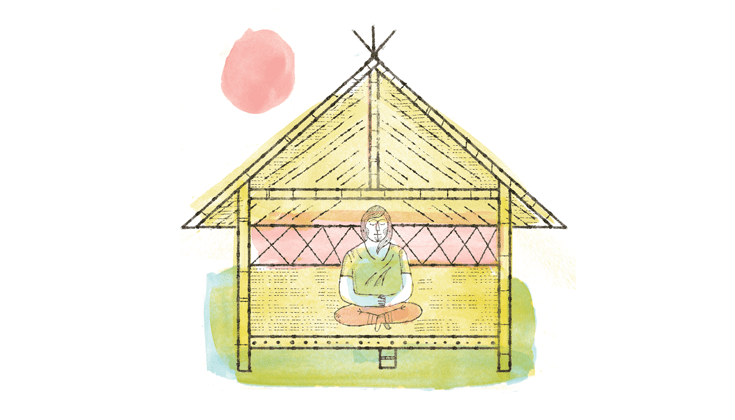Why is going on a Buddhist retreat helpful?
Along with daily practice, Buddhism recommends taking time off for a longer and deeper experience of meditation. Of course, every meditation session is a form of retreat; you are stepping out of your normal activities to be alone with your mind, body, and breath. But a longer retreat—a week, a weekend, or just a full day—offers you the opportunity to spend some real quality time with your mind.
It won’t always be fun. Without your usual entertainments and activities to distract you, you will be left alone with your mind, including both its wisdom and calm and its speed and confusion. You may be a bit shocked at first by what you see, but if you adopt a friendly and kind attitude toward yourself—and maybe a bit of humor—you will gradually settle down and enjoy the meditative experience of being grounded, open, and awake. Many Buddhist and other spiritual centers offer retreats and opportunities for longer practice to nonmembers. Or you can just set aside a day or weekend at home, turn off the phone and the Internet, and spend some quality time alone. There’s no better way to make friends with your mind.
Advice for going on Buddhist retreat
6 tips for getting ready for a meditation retreat
“How do you know, asks Zen teacher Karen Maezen Miller, “if you are prepared to handle the silence, the physical rigors, the discipline, and the mental intensity of a prolonged meditation retreat?”
How to Have a Successful Buddhist Retreat Experience
Christine Skarda’s advice for a successful retreat.
On Retreat, Block All Exits
It takes courage to undertake a retreat, says Andrew Holecek. But in that container, we find freedom.
When the Retreat Is Over
Yongey Mingyur Rinpoche recently spent more than four years on wandering retreat in India and the Himalayas. In an interview with Buddhadharma, he shared his most challenging moments as well as practical advice for returning home.
Long-term and solo Buddhist retreats
When is it appropriate to do a long-term retreat?
At what point is it appropriate to consider doing a three-year retreat or very long-term, isolated meditation? Three Buddhist teachers share their answers.
Before You Go on a Long Retreat
Andrew Holecek offers some practical advice.
Going Solo
A solitary retreat offers the opportunity to deepen one’s practice in profound and lasting ways. But it’s not without pitfalls. Marshall Glickman reports on the benefits and drawbacks.
Personal stories and teachings about Buddhist retreat practice
Answering the Call to Awaken
Like the Buddha, we all get our call to wake up. It often comes when life isn’t working and we may have to go a little crazy. Here’s how Buddhist teacher Spring Washam answered her call.
That Time I Sobbed My Way Through a Himalayan Meditation Retreat
After soldiering through his grief, Jaimal Yogis sat down, looked at his mind, and let the floodgates open. There were a lot of tears — but who said that’s a bad thing?
It! It! It!
Eeek! Eeek! Eeek! the bird cried. It! It! It! And the world as Peter Coyote had experienced it ended. Forty years after his first sesshin, the actor and writer finally gets the point of Zen.
Find Your Heart in Loneliness
Teachings on the Tibetan yogi Milarepa, Chögyam Trungpa Rinpoche describes the experience of desolateness. Like Milarepa when he meditated in his cave, when we are alone, we may begin a love affair with sadness.
